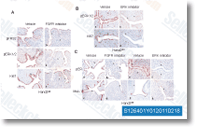The mTOR activated kinase S6K1 is identified to phos phorylate and destablize IRS1 and IRS2 in insulin like development issue responsive cells. mTOR inhibi tion lowers S6K1 action, creating a rise in IRS1/ two and enhanced activation of IGFR1 dependent Akt action. Of note, the IGF pathway regulates ER perform via S6K, providing a powerful hyperlink among mTOR and ER action. The LTED cells showed a slight, but expected, enhance in IRS1 in response to RAD001. Nevertheless, each the LTED and BT474 AROM3 showed improved pHER3, which also correlated with enhanced pAKT. Former research have shown the HER3/ PI3K signaling pathway increases expression of survivin, an inhibitor of apoptosis in HER2 expressing cell lines, and is connected with resistance to laptinib and che motherapy.
Though RAD001 includes a significant affect over the HER2 overexpressing cell lines, the enhanced HER3 signaling may possibly impede its long-term effi cacy. The activation of pAKT is acknowledged like a probably escape route from inhibition of mTORC1, plus the selleckchem information from this examine indicate that this persists in mixture with endocrine therapy. Dual targeting of mTOR and upstream HER pathways, in conjunction with endocrine treatment, is likely to be additional effective. Conclusions RAD001 in blend with endocrine therapy supplies minor more advantage compared with endocrine treatment alone within a model of hormone sensitive ER BC. In contrast, RAD001 was productive as monotherapy in ER endocrine resistant cells based on HER2 overexpression or amplifica tion, and in those cells with acquired resistance, maintained E deprivation was important for maximal effectiveness of RAD001.
The benefit may possibly reflect interruption selleck chemical tgf beta receptor inhibitor of development factor dependent transactivation of ER. The results offer mechanistic help for current favourable clinical data to the blend of RAD001 and endocrine therapy, too as data on probable routes of escape by enhanced HER2/3 signaling, which merit investigation for even further  enhancements in treatment method efficacy. Within a earlier situation of Breast Cancer Research Tomasz Byrski and colleagues existing the results of the potential phase II review of cisplatin in BRCA1 relevant metastatic breast cancer that is, breast cancer arising in girls having a germline mutation in BRCA1. They report proof of considerable ecacy with an all round response rate of 80%, together with 45% with comprehensive response, in addition to a time to progression of twelve months. The vast majority of individuals inside the review had triple receptor unfavorable breast cancer, and this time for you to progression compares favorably with median progression absolutely free survival for triple receptor damaging breast cancer in modern series.
enhancements in treatment method efficacy. Within a earlier situation of Breast Cancer Research Tomasz Byrski and colleagues existing the results of the potential phase II review of cisplatin in BRCA1 relevant metastatic breast cancer that is, breast cancer arising in girls having a germline mutation in BRCA1. They report proof of considerable ecacy with an all round response rate of 80%, together with 45% with comprehensive response, in addition to a time to progression of twelve months. The vast majority of individuals inside the review had triple receptor unfavorable breast cancer, and this time for you to progression compares favorably with median progression absolutely free survival for triple receptor damaging breast cancer in modern series.
TCR Signal
Transcription is regulated by proteins called sigma factors.
